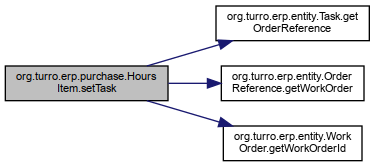- Author
- Lluis Turró Cutiller lluis.nosp@m.@tur.nosp@m.ro.or.nosp@m.g
Definition at line 33 of file HoursItem.java.
◆ getConcept()
| String org.turro.erp.purchase.HoursItem.getConcept |
( |
| ) |
|
◆ getCostHour()
| double org.turro.erp.purchase.HoursItem.getCostHour |
( |
| ) |
|
◆ getDedication()
| double org.turro.erp.purchase.HoursItem.getDedication |
( |
| ) |
|
◆ getOrderRef()
| int org.turro.erp.purchase.HoursItem.getOrderRef |
( |
| ) |
|
◆ getOrderReference()
◆ getResourceAptitude()
◆ getStartWorking()
| Date org.turro.erp.purchase.HoursItem.getStartWorking |
( |
| ) |
|
◆ getTask()
| Task org.turro.erp.purchase.HoursItem.getTask |
( |
| ) |
|
◆ getUnits()
| double org.turro.erp.purchase.HoursItem.getUnits |
( |
| ) |
|
◆ getWorkOrder()
| WorkOrder org.turro.erp.purchase.HoursItem.getWorkOrder |
( |
| ) |
|
◆ getWorkOrderId()
| long org.turro.erp.purchase.HoursItem.getWorkOrderId |
( |
| ) |
|
◆ isAutomatic()
| boolean org.turro.erp.purchase.HoursItem.isAutomatic |
( |
| ) |
|
◆ setAutomatic()
| void org.turro.erp.purchase.HoursItem.setAutomatic |
( |
boolean |
automatic | ) |
|
Definition at line 68 of file HoursItem.java.
69 if(this.automatic && !automatic) {
71 }
else if(!this.automatic && automatic && resourceAptitude !=
null) {
74 this.automatic = automatic;
◆ setConcept()
| void org.turro.erp.purchase.HoursItem.setConcept |
( |
String |
concept | ) |
|
◆ setCostHour()
| void org.turro.erp.purchase.HoursItem.setCostHour |
( |
double |
costHour | ) |
|
◆ setDedication()
| void org.turro.erp.purchase.HoursItem.setDedication |
( |
double |
dedication | ) |
|
◆ setOrderRef()
| void org.turro.erp.purchase.HoursItem.setOrderRef |
( |
int |
orderRef | ) |
|
Definition at line 105 of file HoursItem.java.
106 if(this.orderRef != orderRef) {
107 orderReference =
null;
110 if(or.getOrderRef() == orderRef) {
116 this.orderRef = orderRef;
Set< OrderReference > getOrderReferences()
◆ setOrderReference()
| void org.turro.erp.purchase.HoursItem.setOrderReference |
( |
OrderReference |
orderReference | ) |
|
Definition at line 123 of file HoursItem.java.
124 this.orderReference = orderReference;
◆ setResourceAptitude()
| void org.turro.erp.purchase.HoursItem.setResourceAptitude |
( |
ResourceAptitude |
resourceAptitude | ) |
|
Definition at line 131 of file HoursItem.java.
132 this.resourceAptitude = resourceAptitude;
◆ setStartWorking()
| void org.turro.erp.purchase.HoursItem.setStartWorking |
( |
Date |
startWorking | ) |
|
◆ setTask()
| void org.turro.erp.purchase.HoursItem.setTask |
( |
Task |
task | ) |
|
◆ setUnits()
| void org.turro.erp.purchase.HoursItem.setUnits |
( |
double |
units | ) |
|
◆ setWorkOrder()
| void org.turro.erp.purchase.HoursItem.setWorkOrder |
( |
WorkOrder |
workOrder | ) |
|
◆ setWorkOrderId()
| void org.turro.erp.purchase.HoursItem.setWorkOrderId |
( |
long |
workOrderId | ) |
|
Definition at line 175 of file HoursItem.java.
176 if(this.workOrderId != workOrderId) {
179 orderReference =
null;
182 this.workOrderId = workOrderId;
static WorkOrder getByWorkOrderId(long value)
The documentation for this class was generated from the following file:





